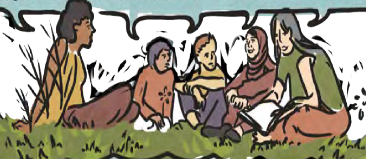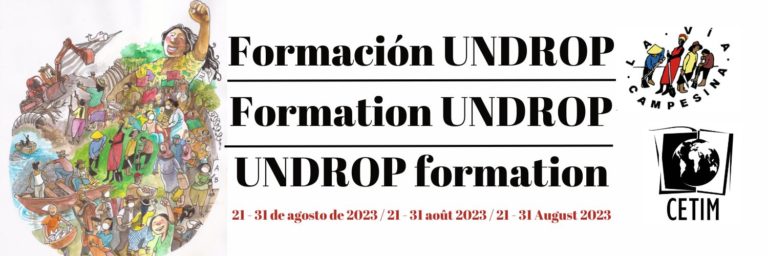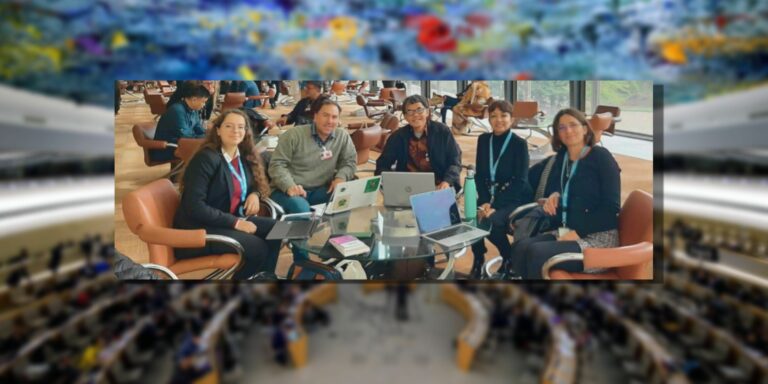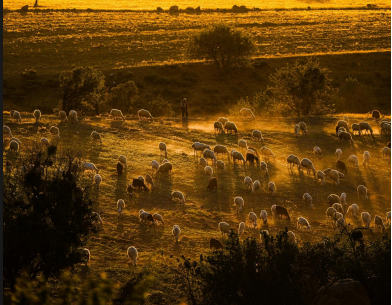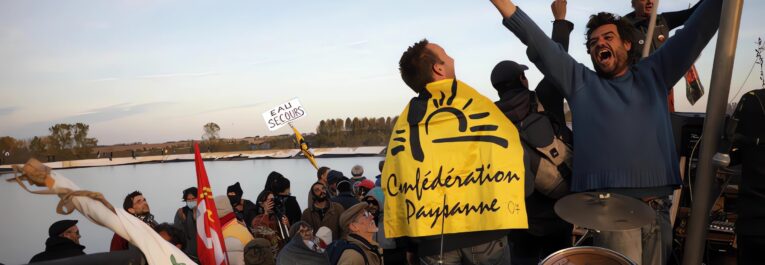Peasants Rights Now!
This article was first published in Peasants Voice, the All Nepal Peasant Federation (ANPFa) Bulletin, in May 2022. In this article Pramesh Pokharel, who is General Secretary of ANPFa, introduces the UNDROP and encourages Nepalese peasants to appropriate the UNDROP and use it for their struggles.
Background
We know about various United Nations instruments to protect the right of people and communities such as the Universal Declaration of Human Rights (UDHR, 1948), Covenant on Economic and Socio-Cultural Rights (CESCR, 1966), Rights of Disabled Persons (1975), Indigenous People Rights (2007), Viena Declaration (1993), ILO 169, Refugee Rights (1951), Convention on the elimimation of all Forms of Discrimination Against Women (CEDAW, 1979), Convention on the Rights of Children (1989), etc. These all international instrument has played an important role to protect the rights of respective groups and in many cases with clear legal provisions at the national level. However, in the case of small food producers, who are mainly the victim of systemic and structural crises, these UN Standards were insufficient and did not address the issue specifically. That is why and how peasants of the world were demanding for the peasants’ right declaration for at least 30 years. They dreamed it 30 years ago, started the process 20 years ago and after the long and tedious struggle at different levels, the UN Declaration on the rights of peasants
and other people working in rural areas (UNDROP) has been a reality today.
History of UNDROP: The journey from a small village in Indonesia to the United Nations
Yes, History has been created. After really a tough fight against the corporations, corporate-led government, and reactionary forces, the struggle of peasants all over the world led by the global peasant movement, La Via Campesina for the last 17 years has been successful. Those people who feed the world and harmonize nature have a moment of joy. On December 17, 2018; United Nations General Assembly approved the UNDROP. The movement led bottom-up journey which started from the Villages in Indonesia in 2001 AD, ended with a historical achievement. The resolution was approved by 119 votes in favor, 7 votes against, and 49 abstentions.
The issue of “rights of peasants” started with the LVC’s struggle against neo-liberalism and the birth of the concept of food sovereignty. With the initiative of SPI (Serikat Petani Indonesia), the process from 2001 to 2008 was internal, to the Indonesian government. La Via Campesina adopted the draft Declaration in 2008. Two years later, the UN Human Rights Council instructed the 18 independent expert members of its Advisory Committee to propose ways and means to protect the rights of peasants and other people working in rural areas. The Advisory Committee strongly proposed the need of protecting peasants’ rights and presented its final study. The draft declaration was adopted by Human Rights Council in September in 2012. Then UNHCR created an open-ended intergovernmental working group to negotiate the draft Declaration. There were many changes in the draft during its fifth round of the open-ended intergovernmental working group (OEIWG) in the Human Rights Council in Geneva for five years. ANPFa was activly participated in all OEIWG.
Success: Glorious Victory
This Declaration is now a historical document. The rights enshrined under the Declaration are not just of farmers but alsofor the fisherfolks, pastoral communities, indigenous people, migrant and seasonal workers, dairy workers, rural women, youth, etc. It recognizes all of them as rights holders (individual & collective) and provides for various protections from the State. Through this Declaration, millions of peasants around the world would be able to reclaim their rights to feed their families and communities, as it recognizes the fundamental role of small-scale food producers while also offering them tangible prospects for decent working and living conditions, consequently making this world a safer place for peasants.
The document bridges the legal gaps in regard to the protection of peasants’ rights and of other people working in rural areas at the international human rights level. Though it is not binding, it is sufficient to argue in legal instances at all levels. For peasant movements, this new instrument can be an important point of reference in their local struggles for seeds, land, and better working conditions as was as move towards peasants right act in their respective countries.
La Via Campesina along with some other organizations The International Union of Food, Agricultural, Hotel, Restaurant, Catering, Tobacco and Allied Workers’ Association (IUF), World Forum of Fisher Peoples (WFFP), Federation of Rural Adult Catholic Movement (FIMARC), International Indian Treaty Council (IITC), Association Centre Europe-Tiers Monde (CETIM), FIAN International, International Association of Democratic Lawyers (IADL), Bread for All, South Asian Feminist Alliance for Economic and Socio-cultural Rights, etc played a significant role in this process. Human Rights council Chair Ambassador of Bolivia Angélica Navarro and progressive states of Bolivia, Cuba, Venezuela, Nepal, etc strongly favored the declaration from the beginning whereas few neo-liberal states including the UK, US, and some members of the EU were against it.
Contents of Declaration
The final declaration has 28 articles and a two-page long preamble. The preamble has recognized and addressed the challenges faced by small food producers around the world and highlighted the need of ensuring food sovereignty to solve many problems of peasantry and agriculture. With the clear definition of peasants (Article One), it has highlighted the duties and obligations of the state to ensure the rights enshrined in the declaration. Similarly, the declaration demands that the rights to food, right to peasantry and agriculture. With the clear definition of peasants (Article One), it has highlighted the duties and obligations of the state to ensure the rights enshrined in the declaration. Similarly, the declaration demands that the rights to food, right to land, rights to seeds, and biodiversity, and traditional knowledge and practices of peasants be protected. The declaration also protects, recognizes, and values the work of small food producers, mainly peasant women.
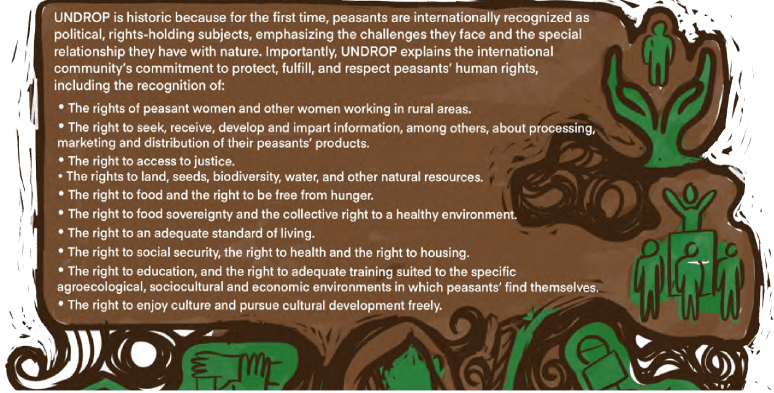
The peasant’s rights declaration has also addressed that neoliberal policies and corporate agriculture are the major threat to small food producers. Being a compromised document, the document may not be as progressive as we expect or want, but having a document from the UNO is really a success. Though, it could not ask the state to ensure the right to food sovereignty and move towards sustainable local agroecological practices banning harmful transgenic seeds, poisonous pesticides, and chemicals; there are provisions that have clearly mentioned that agroecological practices and food sovereignty are the right way to safe guard the rights of peasants transform agriculture Therefore, it is really a progressive document to ensure the rights of small food producers and ensure them a dignified life.
Time to celebrate, time to Act
If we don’t use the documents in our struggle, if we don’t ask our states to ratify and implement this declaration, it will not have an impact on the lives of peasants around the world. Therefore, we have a huge responsibility ahead. We must counter existing anti-peasants provisions in the legislation that is not in accordance with the declaration. We need to pressurize the governments of all levels, (local, provincial, and federal) to implement the provisions of the Declaration.
There are more tasks ahead. Immediately, translation of declaration in local language and Training of Trainers for massive awareness is important. Formation of pro-peasants Public policies and Peasants Right Law are equally important. At the same time, at the global level, lobbying in United Nations, especially in International Fund for Agricultural Development, Food and Agriculture Organizations and United Nations human rights commissions are equally important to form the mechanism of implementation and integrate it under other global agendas such as decade of family farming, sustainable development goals is also urgent. Peasants’ Activists need to use these tools at all levels advocacy, campaign, and organizational work.
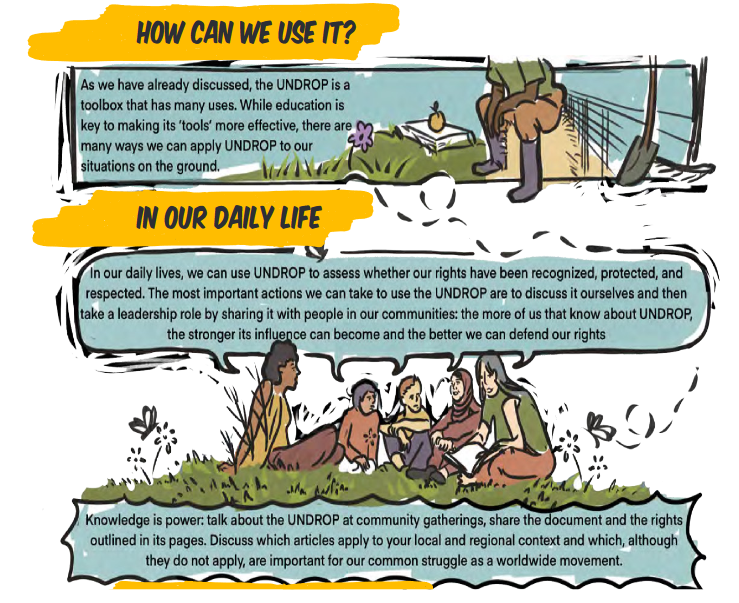
A Tool to Face the Dilemmas of Humanity
At Present, not only the peasant communities but the humanity at all is being challenged by the neoliberal crisis and pandemic of COVID 19. For the present generation of the world, it was evident again that Capitalism is the major cause of all the challenges we are facing today. Increasing inequality, injustices, and hunger in the world, the devastation of the natural environment resulting climate crisis, degradation of the agricultural environment, and marginalization of peasants are the direct impacts of the neoliberal corporate Capitalist system. There was a clear difference in Socialist and Capitalist responses during the Pandemic. While Countries with public health care systems, pro-people governments, and Socialist economies such as Cuba, China, Kerala State of India, etc were successful in containing the Pandemic, people in capitalist states suffered most. Therefore, the demands put forward by la via Campesina with the banner of Food Sovereignty have been proven the right way to address the challenges faced by humanity today.
When the borders were sealed, industries and transport were closed and most people in the world were under lockdown, the peasants of the world were producing the food and feeding the world. They were the ones who were following the health protocol staying at home as well as doing their farm work. The same small-scale food producers of the world who rarely rely on external inputs, markets, labor, and transport, whom the Capitalist world undermines as traditional, rural, unprofessional farmers; actually they were feeding the world when the world trade regime collapsed and industrial farming shutdown. That is why we say, small producers are the steward of nature, they feed the world. The message given by small producers, the peasants’ agriculture is not only eco-friendly, healthy, and humanitarian but also can feed the world; has been validated. They are saying, it’s the right time to change the system and move to a localized food system self reliant economy and food sovereignty.
Why Peasants Rights Now?
The capitalist world is full of contradictions and paradoxes. Along with historically widest inequality, this system lives with the paradox that those small food producers; peasants, landless, rural workers, herders, forest dwellers, pastoralists, fisherfolks, and people living in rural areas who produce more than 70% of the world’s food in harmony with nature are not having a dignified life like other human beings. And in their profit monger, they claim commercialization, industrialization, and company farming are of greater significance. Peasants are sidelined by mainstream policies of neoliberal capitalism, highly neglected, and excluded from the thought called politico-economic development. Unfortunately, the same population constitutes the majority of people living with poverty and hunger, suffering from violence, displacement, and marginalization lacking access to and control over resources. If we see the reported formal statistics too, they are not only the primary victims of civil and political rights violations but even victims of inhuman seed laws, profit monger agri-policies, dislocation of multinational corporations, and chemical farming practices. Surprisingly, there was not any specific provision under Human rights and international law to safeguard their rights. Its time to implement UNDROP. Therefore Peasants of the world are demanding “Peasants Rights Now”. It is only the right way of addressing poverty, hunger, inequality etc but aslo an important step towards transforming agriculture and rural lives and sustainable development.


